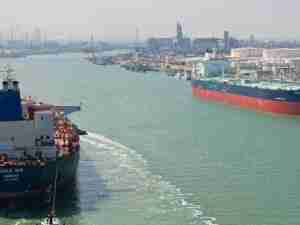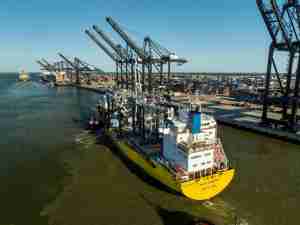The Ports of Seattle and Tacoma, and the Puget Sound Clean Air Agency announced a combined match of $318,000 in additional funding for the Clean Air Agency's Puget Sound Ports Cargo-Handling Equipment Replacement and Retrofit Program. This comes on top of $850,000 from the US Environmental Protection Agency (EPA), for this new initiative that combines environmental stewardship efforts of several agencies.
The funding supports the retrofit or replacement of 38 off-highway trucks, cranes and forklifts at the Port of Seattle, which is approximately 10 percent of its fleet. At the Port of Tacoma, 50 to 60 terminal tractors, cranes, off-highway trucks and general industrial equipment will be retrofitted. That's about 14 percent of its fleet. All the replaced and retrofitted equipment will use ultra-low sulfur diesel.
"The Port of Seattle is committed to creating jobs while protecting our environment," said Port of Seattle Commission President Bill Bryant, "and we are building partnerships that help us do both. Retrofitting our equipment with these funds will help give us cleaner air now."
"These funds will help build on the collaborative efforts under way by both ports, our customers and the Puget Sound Clean Air Agency to make our region a cleaner, safer place to live and work," said Port of Tacoma Commission President Clare Petrich.
"Reducing pollution from diesel engines working in our communities is one of the highest priorities for our agency. Public health experts have recently concluded that people live longer lives when their exposure to fine particles (soot) is reduced," said Dennis McLerran, Executive Director of the Puget Sound Clean Air Agency.
"We look forward to implementing this and more diesel emission reduction projects with partners in the Northwest Ports Clean Air Strategy. Through our Diesel Solutions program we have now cleaned up over 5,000 diesel engines in the region. Partnerships with the Ports of Seattle and Tacoma, US EPA and the Washington Department of Ecology have been key to that success," McLerran said.
The EPA grant of $850,000 is matched with $118,000 from the PSCAA and $200,000 from the Ports of Seattle and Tacoma. The project will substantially reduce diesel particulate matter through a combination of off-highway truck replacements and cargo-handling equipment retrofits. It will also further goals outlined in the NW Ports Clean Air Strategy.
The strategy is a collaborative effort between the Port of Seattle, Port of Tacoma and Port Metro Vancouver (British Columbia) to reduce seaport-related air emissions in the region. It establishes short- and long-term performance measures to reduce emissions from cargo-handling equipment, rail, ocean-going vessels and trucks.










